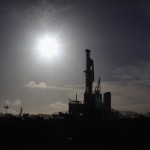Regulators Close Case on Flaming Texas Water, Researcher Says Not So Fast
The growing presence of methane in the water wells of a suburban Dallas community cannot be linked to nearby drilling activity even though methane levels have risen in several wells in the area since drilling began, according to a report released by the state’s oil and gas regulator. But other scientists who study the issue are not so sure there is no link to drilling.
The report released last week by the Railroad Commission of Texas says it found no evidence that elevated levels of methane in the water or the Parker county housing development ‘Silverado on the Brazos’ is caused by gas drilling operations. The report also says further investigation into a potential link “is not planned at this time.”
“I was surprised that the commission isn’t planning to do some more testing,” Rob Jackson, professor of Earth Sciences at Stanford University who is also studying the issue, says. “Their own data found that five of eight water wells had increasing methane concentration through time. That alone seems like enough reason to follow up.”
Jackson is planning to publish his own findings on the region’s water. Another study by former EPA scientist Geoffrey Thyne indicates the methane is linked to drilling, though Range Resources, the drilling company that owns nearby drilling wells has dismissed the scientists findings, and says the methane is naturally occurring.
But continued uncertainty over the source of the methane makes Jackson believe the case deserves further research.
“For some of these houses the amount of methane in the water is very high,” he says. “I think the study shows methane increasing, and also ethane and propane.”
“I think it’s the Railroad Commission’s job to see this to the end, to get to the bottom of what’s happened there and protect the homeowners,” he adds.
In its report, the Railroad Commission says it’s aware of other studies, presumably in reference to Jackson’s work, and “welcomes the opportunity to review them.” In the meantime, the report suggests that residents concerned with methane “properly ventilate and aerate their water systems.”
Read the full report:

